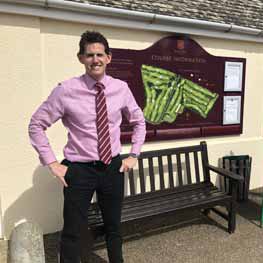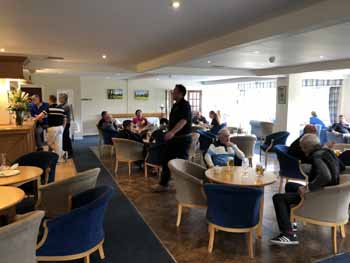Meet the golf club manager: Leighton Walker
The general manager of Burford Golf Club in Oxfordshire talks about improving a club that already has a full membership and a joining fee and what it’s like to be an Australian managing a British golf club

Leighton Walker
What has been your career path to becoming the manager of Burford Golf Club, and can you explain a little about what Burford is like?
I have a slightly international flavour to my entry into the industry. My original home is Adelaide, Australia and I started my golf management career at a nine-hole club in the northern suburbs of Adelaide.
I spent a lot of my youth playing golf and competed at a reasonably high amateur level before realising that the PGA route wasn’t for me. Having spent some time managing different types of retail businesses I was lucky enough to get my first role over 15 years ago at a club called Penfield in Adelaide and I haven’t looked back from there. Arriving in the UK in late 2004 I landed my first role as deputy manager at Thornbury, Bristol which was a part of the Burhill group. This was a great experience and a really good grounding for the rest of my career.

I had a great mentor there in Kevin Pickett and we achieved some good things but most importantly it gave me a real exposure to the commercial side of the golf business. After a short stint with Crown Golf following this, I moved into my first general manager role seven years ago and following roles at Ross-on-Wye and Chippenham I started at Burford in March 2016. Burford is a real ‘hidden gem’ in the heart of the Cotswolds. Great club with an excellent tree-lined course. We are very fortunate to have a strong membership (nearly 800 playing members) with a waiting list and joining fee which we know only too well is rare these days. We enjoy some strong visitor business as well.

What were your main objectives when arriving at Burford?
Our membership position is strong and we will always need to keep a careful eye on this to ensure it remains strong but I guess the main areas that I saw as needing improvement were communication and structure.
We have a great team at Burford and the club has always looked after its employees really well, but some areas just needed a freshen up and a look forward to the future. We took our catering in-house in early 2017 and this is now starting to bear fruit with a strong team now in place. Our long standing head professional who had served the club well for 18 years retired in September 2017, but taking a postive outlook, this represented a real opportunity to modernise and improve the retail and teaching offers but also provide a different level of service. Duncan Moore, our new head professional, has settled in really well and created a great impression and we look forward to Duncan having a long tenure with the club.
In terms of communication, it’s about keeping the members up to date with what’s happening through email updates, the website and where it’s a bigger project or you’re looking to get more information across – a members’ information evening. We’ve held several of these meetings and there have generally been in excess of 100 members attending every time.

What is the club’s approach to customer service?
This is something we’re trying to improve every day. Arguably with our situation membership situation we should be able to put some more focus on making the member’s experience better and more enjoyable and that will be a real focus this year. We will be carrying out some training with our team in June with Kevin Fish who is very strong in this area and it will be about setting the standard we want to provide at Burford. That standard should be attentive but relaxed and welcoming. We have a great team across the whole club and I think they are really ready to take our service to the next level.

You recently featured on the Private Club Radio Show, talking about, among other issues, how younger leaders are driving change in the UK. Can you tell us more about this?
Private Club Radio is a really good resource for the club industry. Younger leaders driving change is something I’m quite passionate about and am keen to promote. It’s been amazing to see the change in my time in the industry in terms of younger people coming into golf management via different means whether it be food and beverage, fitness, hotel or now we’re even starting to see university graduates come through from Bournemouth, Birmingham and Buckinghamshire. We’ll always see managers from all ages and all walks of life which is great, but I think what we’re seeing more and more is the professionalisation of the industry. People with really rounded skill sets, a deeper knowledge of the golf environment but really importantly an eye to the future. This is a fantastic game and industry, but like everything in life, positive change is critical for the game to thrive but also remain relevant.

You’ve been in management roles at four golf clubs in the UK and one in Australia, are there differences between the roles and experiences between the two countries?
The differences are not huge and most countries like Australia, UK, America, Canada and so on tend to follow similar trends. Australia and the UK tend to be quite golf centric with their clubs but I guess the main difference between Australia and the UK is that, as a general rule, the UK will tend to embrace tradition in a bigger way. Clubs in Australia really look to reinvent themselves a bit more through facilities’ improvements and course changes.
Of course there’s always positives and negatives to that but there’s so much to love about both parts of the world and I’ve been very lucky to have experienced the two. In fact I was just back in Australia two weeks ago and I spoke to a couple of managers over there. They were both very much coming from the same position of having to work hard to attract members but were looking to do this through investing and ensuring their facilities (course, clubhouse and practice) were of the highest quality possible.

A recent study found that most managers of most UK organisations have not received sufficient training. Have you been able to do anything to ensure you have received the training your position requires?
I am quite an active member of the Club Managers Association of Europe [CMAE] and am on the board of the London and Home Counties region. Going back to my role at Chippenham, I set myself on a path (and was very grateful to be supported by the club) to complete the MDP (Management Development Program) programme and work towards the CCM (Certified Club Manager) qualification. I am approximately two-thirds of the way through this.
I am extremely grateful to Burford Golf Club for also allowing me to pursue this path and I recently attended the World Conference in San Francisco which was a fantastic experience.
The Management Development Program is first class and I would recommend it to any manager. For me, continual education is very important, but most importantly, the club must also gain from this education. From my experience this has been the case but going back to a previous point, this education can only ensure that our managers are professionally trained to deliver the best results for their club.

What does the CMAE work involve?
CMAE is all about education, networking and developing club managers.
Our task within the London & Home Counties board is to provide a programme for our members that will engage them and provide relevant education and networking opportunities.
We feel the CCM qualification will become a standard in time and something all clubs will look for when they recruit managers, so it’s important that we provide a pathway towards this.

What are your views on some contentious issues in the industry: dress codes; men-only golf clubs; footgolf; adventure golf; and selling or converting land for housing?
Dress codes – this really comes down to the club. I do personally feel that dress codes in clubhouses need to more accurately reflect what takes place in modern society, such as pubs, restaurants and so on, if we want to attract more people into our clubhouses. Having said that, I do still feel there is a place for maintaining a level of quality in what we ask for from our members and visitors. Too much of the argument just boils down to denim jeans but if everyone dressed in a smart and respectful way, we couldn’t go too far wrong could we?
Selling or converting land for housing – in my humble opinion this will be the biggest game changer for a lot of clubs in the near to mid term. Golf clubs will realise they have very valuable assets, especially those in urban areas. Under the right circumstances these assets could be disposed of to provide much-needed funds to develop facilities to future-proof that club. I caught the tail-end of this at Chippenham and it was life-saving for that club with a new clubhouse, course and practice ground improvements but most importantly long-term financial security. It won’t work for all clubs but for many it may be a really sensible way to go.

What does the future hold for Burford?
We are currently addressing potential improvements to our clubhouse. Built in the early 60s, the building serves the club well but it’s maybe at that point where it could do with some modernisation, but also making better use of the spaces. We are a bit light on for short game practice facilties and this will be explored further over the coming months.

This may include a new chipping green.















Let me tell You a sad story ! There are no comments yet, but You can be first one to comment this article.
Write a comment